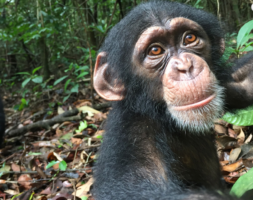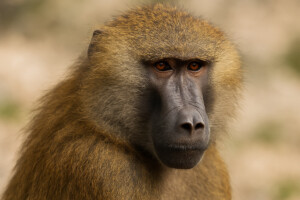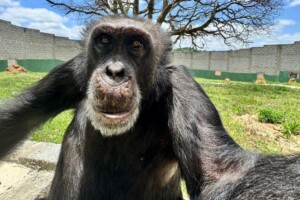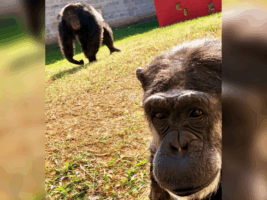Three baby chimps are rescued
posted in
23
Jul
2009

LIMBE SANCTUARY, AFRICA
An operation developed together by Cameroon Republic Environmental Department and Limbe Sanctuary rescued three two-year old baby chimps in a wood extraction camp in the countryside of Cameroon. The baby chimps were under control of an Italian man, who had been arrested by the authorities. Vet of the sanctuary, John Kiyang, and the chief in charge of the keepers, Jonathan Kang, accompanied the officers in the operation and the poachers did not resist it. The trip to the sanctuary was not simple and took more than one day, because one truck had an accident and blocked the way. The chimpanzees were highly ressed and when they arrived at the sanctuary they were put into quarantine, were examined and fed. The babies are two males and one female, called Tikar, Ntui and Ngambe. Ntui, the youngest male, did not want to drink milk in the beginning and took him a while to get used to it. This rescue happened in May and the three chimpanzees are already well adapted to the sanctuary and have two milk bottles every day.
An operation developed together by Cameroon Republic Environmental Department and Limbe Sanctuary rescued three two-year old baby chimps in a wood extraction camp in the countryside of Cameroon. The baby chimps were under control of an Italian man, who had been arrested by the authorities. Vet of the sanctuary, John Kiyang, and the chief in charge of the keepers, Jonathan Kang, accompanied the officers in the operation and the poachers did not resist it. The trip to the sanctuary was not simple and took more than one day, because one truck had an accident and blocked the way. The chimpanzees were highly ressed and when they arrived at the sanctuary they were put into quarantine, were examined and fed. The babies are two males and one female, called Tikar, Ntui and Ngambe. Ntui, the youngest male, did not want to drink milk in the beginning and took him a while to get used to it. This rescue happened in May and the three chimpanzees are already well adapted to the sanctuary and have two milk bottles every day.
Dr. Pedro A. Ynterian
President, GAP Project International

 Español
Español
 Português
Português








